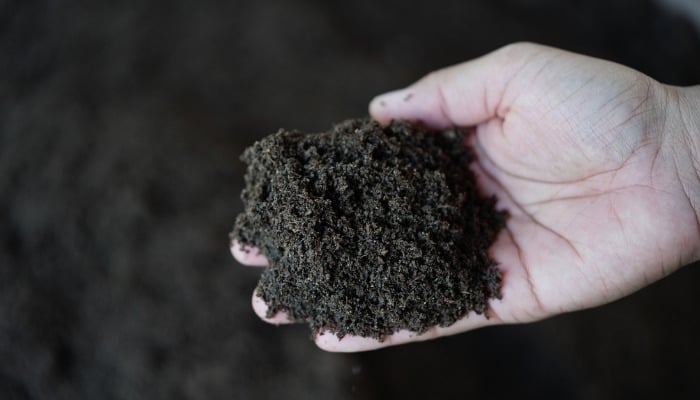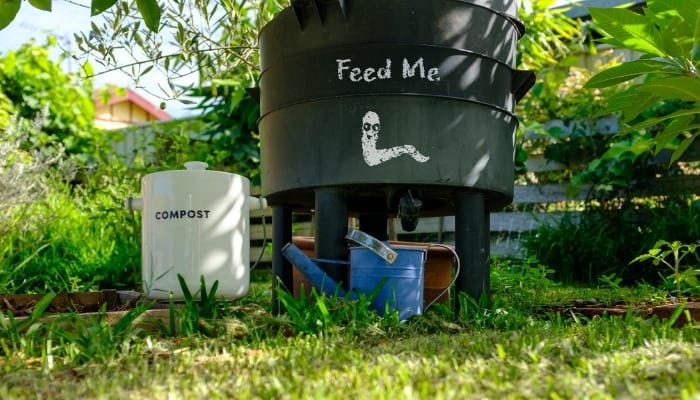Vermicompost tea, also known as worm casting tea or worm tea, has been a popular organic fertilizer for gardens for a considerable amount of time.
The tea is made by steeping worm manure in water, and it is then used to water plants. Worms eat organic materials and food scraps, so the manure used is full of healthy microbes and nutrients.
Can you make tea from worm castings? Yes! People have been using vermiculture, or worm farming, to produce worm castings for decades. While this manure can be placed directly into the soil for your plants, steeping the castings in tea makes it easy to spread the beneficial ingredients across your garden.
Just like brewing a pot of tea, the process to make worm casting tea is extremely easy. It is worth the small-time investment because your plants will flourish thanks to the benefits!
Worm Casting Tea – What To Know
When you first heard of worm casting tea, you might be a little confused. Is it made of worms? What is a casting? Can I drink it? (No.)
What Is Worm Casting Tea?
Worm casting tea is a liquid fertilizer created by steeping worm manure in water.
The beneficial microbes and nutrients are transferred to the water. This liquid can then be easily applied to your garden.
Is Worm Casting Tea Good for Plants?
Worm casting tea is an excellent fertilizer for your plants. It adds healthy microbes to the soil that help keep plant roots healthy and defend against pests or diseases.
The nutrients give the plant everything they need to grow.
What Does Worm Casting Tea Do for Plants?
Studies have shown that the microbes found in a worm casting tea can help with plant immunity.
These microbes boost the health of the soil, which in turn helps the plant to defend itself against pests and diseases.
In controlled experiments, plants treated with worm casting tea have been resilient against pathogens that have killed the same species of plants when left untreated.
Worm Casting Tea Benefits
Worm casting tea adds healthy microbes and nutrients to the soil. Microbes are essential for creating homeostasis in the soil.
The healthiest soil environment includes roots, water, and these microbes. In addition, nutrients from the castings replenish nutrient levels in the soil.
The benefit of using worm tea over solid worm castings is that you can spread the product easier.
Instead of trying to mix the castings throughout the soil of your garden, you can easily use a watering can or a dilution nozzle on the hose to spread the liquid fertilizer.
Nutrients in Worm Casting Tea
Worm casting tea contains large amounts of nitrogen, phosphorus, and potassium. These are all essential nutrients in plant growth and health.
Magnesium and calcium can also be found in worm tea. Additionally, the microbes in the tea are nitrogen-fixing, binding gaseous nitrogen into the soil for the plants to use.
Worm Casting Tea NPK
NPK is the ratio of nitrogen to phosphorus to potassium in a fertilizer. In general, organic fertilizers will have lower concentrations of nutrients than artificial fertilizers.
For worm castings, the NPK averages around 5-5-3.
It is important to note that the NPK of worm casting tea will vary greatly based on the diet of the worms, the concentration of the tea, and the quality of the water.
How Long Does Worm Casting Tea Last?
The beneficial microbes in worm casting tea can last in the soil indefinitely. In the right conditions, they will continue to multiply and survive in the soil.
The nutrients in the tea will be used up at varying rates by the plants. Additionally, periods of drought or excessive rain can cause the soil to dry out or leach nutrients from the soil.
It is often recommended to reapply worm casting tea every two weeks during the growing season.
Does Worm Casting Tea Go Bad?
The nutrients in worm casting tea can theoretically survive for a while. However, the microbes are living beings and will begin to die off quickly.
It is best to use the worm tea as soon as possible. In cold temperatures, the microbes in the tea should last up to 72 hours.
In warmer regions, the microbes will die off quicker, so the mixture should be used within 24 hours.
Can You Use Worm Casting Tea as a Foliar Spray?
Foliar sprays are used to cover the plant’s leaves in diluted fertilizer. Plants can absorb small amounts of water and nutrients through their leaves.
Worm casting tea can be used as a foliar spray. It is an especially good option for use as a foliar spray because the nutrients are not highly concentrated.
High concentrations of nutrients can cause fertilizer burns to the leaves.
Which Plants Benefit From Worm Casting Tea?
All plants benefit from worm casting tea. You can use the tea for your flowers, vegetable plants, fruit trees, potted plants, houseplants, shrubs, trees, and lawn grass.
In addition, you can add worm casting tea to your compost pile to help increase the speed of decomposition.
How Long Do You Brew Worm Casting Tea?
Worm casting tea should be brewed for 24 hours. A shorter period will not extract enough of the nutrients and microbes.
A longer period will cause too many of the microbes to die off.
How Often To Use Worm Casting Tea?
It is recommended to apply worm casting tea to your garden every two weeks. Since the nutrients are in lower concentrations, you can apply the tea more frequently if needed.
Can You Use Too Much Worm Casting Tea?
You cannot use too much worm casting tea. Frequent applications will not harm your plants. You may be wasting the worm casting tea if you apply it too frequently though.
The microbe population in the soil can only grow so large, and the plants can only use so many nutrients at one time.
Can Worm Tea Hurt Plants?
It would be very hard to apply enough worm tea to harm your plants. In general, the nutrient concentrations are low enough that they do not pose a problem. Fertilizer burn is highly unlikely.
The only plants that may not do well with worm tea are plants that prefer drought conditions. Since worm tea is a liquid, you are watering and fertilizing your plants at the same time.
Do I Need To Dilute Worm Tea?
Most recipes recommend diluting worm tea by 50% or more. This helps prevent the nutrients from being too highly concentrated.
More importantly, it allows you to cover more surface area with the mixture. The beneficial microbes can reproduce once they are introduced to the soil.
Therefore, you do not need to apply high concentrations of microbes in each part of the garden.
Can Worm Tea Be Used in Hydroponics?
Worm tea can be used in hydroponics. It may not provide enough nutrients for your growing plants though.
If you have any issues, you may need to supplement with additional fertilizer. Also, be mindful that some chemicals used in the hydroponic process may kill off the beneficial microbes.
Worm Casting Tea vs. Compost Tea
Compost tea is created in a similar process as worm tea. Compost is steeped in water and the resulting tea is applied to the garden.
Compost tea also contains nutrients and beneficial microbes, but they are found in different concentrations. Both teas are great options for organic fertilizers.
Compost tea can be a longer process overall because it takes so long to create the compost.
How To Make Worm Casting Tea

Supplies:
- 5-gallon bucket (or appropriate size for your needs)
- 4 gallons of water
- 5-6 cups of worm castings
- 3 tablespoons molasses
- “Teabag” (cheesecloth or old t-shirt) or strainer
Add room temperature or cold water to your bucket. If you are using a “teabag,” secure the fabric around the castings.
You can also mix the castings into the water and use a fine-mesh strainer to remove them afterward. Let the mixture steep for 24 hours.
The liquid will be dark brown. Add additional water until the mixture is light brown (like a weakly brewed tea).
For the highest microbe viability, use the worm tea as soon as possible.
If you are going to be using your worm tea over a couple of days, add an aquarium bubbler (find it here at a great price) to keep the microbes alive longer.
How To Use Worm Casting Tea
Once you create your worm tea, you should use it as soon as possible. Microbes are living creatures and will begin to die off.
Ideally, the tea should be applied to your garden within 24-72 hours.
The mixture will be highly concentrated after steeping, so you will need to dilute it. It should be a light brown color, like weakly brewed tea.
Usually, this means diluting it to 50% (adding the same amount of water as originally used).
You can use a watering can or a sprayer attachment on your hose. The tea can be applied to the leaves of the plants and the soil.
Conclusion
Worm casting tea is easy to make and easy to use. This makes it the perfect organic fertilizer for your garden.
Plus, the added health benefits from the microbes mean your plants can defend themselves against pests and diseases.

